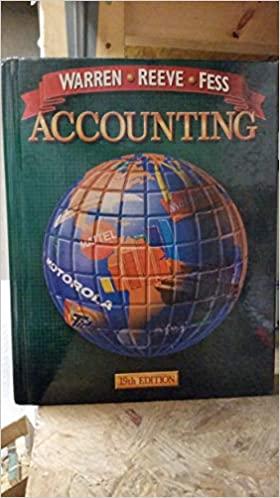Question
Dimanche Company had the following estimates available at the beginning of the year: Indirect Cost Pool #1 $60,000 Indirect Cost Pool #2 $180,000 Labor hours
Dimanche Company had the following estimates available at the beginning of the year:
Indirect Cost Pool #1 $60,000
Indirect Cost Pool #2 $180,000
Labor hours 40,000
Machine hours 80,000
Dimanche uses labor hours to allocate costs from Cost Pool #1, and machine hours to allocate costs from Cost Pool #2.
The following jobs were started during the year:
| Job A1 Prime costs $20,000 Labor hours 5,000 Machine hours 12,000 | Job A2 Prime costs $32,000 Labor hours 8,000 Machine hours 20,000 |
| Job A3 Prime costs $26,000 Labor hours 6,500 Machine hours 13,000 | Job A4 Prime costs $29,000 Labor hours 6,000 Machine hours 9,000 |
| Job A5 Prime costs $18,000 Labor hours 2,400 Machine hours 540 | Job A6 Prime costs $38,000 Labor hours 10,000 Machine hours 30,000 |
Jobs A3 and A5 were still in process at the end of the year. Job A4 was completed but had not been sold at the end of the year.
Actual indirect cost information for the year:
Indirect Cost Pool #1 $ 65,000
Indirect Cost Pool #2 $178,000
Assume any over or under-applied overhead amounts are material.
A. Calculate the pre-determined overhead rates for the year.
B. Calculate the total overhead applied to each job. Calculate the total amount of overhead applied during the year.
C. Calculate the amount of over or under applied overhead for the year for each cost pool and for the firm as a whole.
D. Use the Account Balance pro-ration method to dispose of the over or under applied overhead. Make the necessary journal entries, in good form.
E. Use the Allocated (Applied) Overhead pro-ration method to dispose of the over or under applied overhead. Make the necessary journal entries, in good form. (Note: when allocating over or underapplied overhead using the Allocated Overhead method each cost pool must be allocated separately.)
F. Use the Adjusted Allocation Rate (Actual Allocation) method to determine the net adjustment to each job. Do not prepare the journal entries. What is the benefit of using this method?
G. Calculate the total manufacturing cost that will appear as cost of goods sold on Dimanches income statement using 1) the allocations from D and 2) the allocations from E.
I need help with E, F,& G. I am having trouble with allocating the OH to each cost pool.
Step by Step Solution
There are 3 Steps involved in it
Step: 1

Get Instant Access to Expert-Tailored Solutions
See step-by-step solutions with expert insights and AI powered tools for academic success
Step: 2

Step: 3

Ace Your Homework with AI
Get the answers you need in no time with our AI-driven, step-by-step assistance
Get Started


